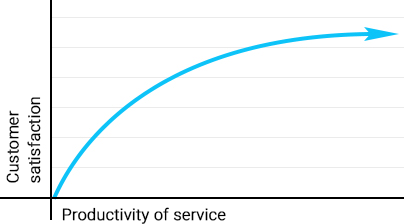Customer satisfaction index and net promoter score
CUSTOMER SATISFACTION INDEX AND NET PROMOTER SCORE
Jonas Ridderstrale, International Business Advisor
It’s not a secret that to land new customers is more expensive than to retain existing ones. Customer retention is possible only in a case of satisfying his needs concerning the price, product quality and a level of providing service.
Regular assessment of Customer Satisfaction Index allows determine availability of emotional connection with a company which affects directly to economic behavior of the customers. By virtue of modern marketing research customer emotions may be measured and necessary actions be developed in order to steer them in the right direction for the company.
Measurement of Net Promoter Score and Customer Satisfaction Index allow develop and implement improvements timely that will not only guarantee regular profit of the company but will increase it.

THE WAY TO CUSTOMER LOYALTY IS THROUGH HIS SATISFACTION
Satisfaction is a key factor of customer retention and formation of customer loyalty.
The customers come to a company with their own expectations concerning product or service quality, price and service level. Success of the company, its finance indicators and its growth as a whole depends on how it will manage to satisfy the expectations of its customers.
Customer Satisfaction Index is an assessment of customer satisfaction level after interaction with a company. CSI reflects how successful customer experience of a consumer was.
Using CSI you may easily estimate the following:
- level of satisfaction with particular process, product or service of a company;
- general customer satisfaction level after interaction with a company;
- customer satisfaction level of competitor company.
Satisfied customer will certainly return for repeat purchasing and there are high chances that he will recommend that company to his friends.
Net Promoter Score, NPS is an index of customer loyalty status and their readiness to recommend a company or brand to their friends based on their own customer experience.
Net Promoter Score allows divide the customers into:
- “Critics” – dissatisfied customers who can leave negative feedback about a company;
- “Neutrals” – satisfied customers who are not loyal to a company and may come over to competitors under more favorable offers;
- “Promoters” – loyal customers who recommend a company, product or service to their friends, ensuring an influx of new customers.
Net Promoter Score shows interaction between the number of loyal customers and company growth prospects. That is why the number of “promoters” and “critics” is very important to count NPS.
Calculator NPS
Count the responses
Add up the number of responses provided for each score.
Group the responses
Add up the total number of responses provided for each group.
Calculate your NPS
Subtract the percentage of Detractors from the percentage of Promoters.
Do you want to know, what does your NPS index mean? Call us on the phone 097 500 79 25 subscription 044 383 95 73 Subscribe to the application and you will be contacted by me.
Jeff Bezos, founder of Amazon.com, said: “If you do build a great experience, customers tell each other about that. Word of mouth is very powerful”. As evidenced by the following statistics:
6 positive recommendations  +1 new customer
+1 new customer
1 negative recommendation  - 5 positive recommendations
- 5 positive recommendations
1 negative recommendation  - 0,83 of new customer
- 0,83 of new customer
1 critic  4-6 negative recommendations
4-6 negative recommendations
1 critic  - 4,15 of new customers
- 4,15 of new customers
As more promoters the company has as more new customers they will land. Loyal customers along with new ones ensure profit growth.

Loyalty increase by 2% gives cost reduction in 10% that leads to profit growth an average of 16% without increase in sales and prices (Leading on the Edge of Chaos, Emmet Murphy & Mark Murphy)
WHY THE MEASUREMENT OF NPS AND CSI IS NEEDED
Assessment of customer loyalty opens up new fields of use in:
Business development
- Profits rise;
- The work is performed to be ahead of the field.
Staff involvement
- Arising of pride for their work and desire to work better;
- Arising of confidence that a customer receives truly valuable product.
Creation of customer-centric company
- Real needs of a customer are determined and satisfied;
- This is a possibility to learn how to listen and hear a customer;
- Received information is a significant background for improvement of a service and internal differentiation of a company.
CES AND SCI EXTEND THE FRONTIERS OF THE STUDY OF CUSTOMER LOYALTY AND SATISFACTION
CES (Customer Effort Score) is an index of the efforts that the customers have to make in order to resolve their issue while interaction with a company.
CES (Customer Effort Score) is a new strong index of customer satisfaction and loyalty. Assessment of customer efforts shows the matters where the improvements are needed.
The less effort a customer should make to satisfy his needs the more is his loyalty to a company which do managed to simplify his life.

SCI (Secure Customer Index) is an index of reliability and confidence in the buyers. SCI expands opportunities of NPS and allows learn deeper customer loyalty.
Secure Index coincides with such parameters of company activity as: profitability, market share and coefficient of regular customers. Coefficient of regular customers increases under SCI index advance.
Secure Customer Index allows identify the customers in each category:
- Secure customers 0.9-1.0: loyal and satisfied consumers.
- Favorable customers 0.8-0.899: satisfied consumers.
- Vulnerable customers 0.7-0.799: disappointed and ready to come over to competitors.
- Risk customers <0.7: use the services of a competitor.

Head of department on work with clients



 For Mystery Shopper
For Mystery Shopper
 Eng
Eng








